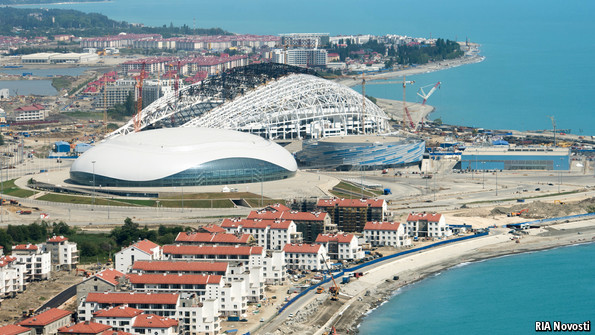No We Don’t Know (or Care) Where Sochi
Is – But It is Somewhere in Russia
With the summer heat occupying everyone and everywhere obviously it is now time to focus on the winter Olympics. Surely that is the one event that is on everyone's agenda.
The world has, in the last several decades gone sports mad in general and Olympics mad in particular. Every two years, for either the winter Olympics or the summer Olympics some country spends huge amounts of money for little or no gain except to entertain the world for a couple of weeks.Russia is apparently taking
this stupidity to a new level.
The world has, in the last several decades gone sports mad in general and Olympics mad in particular. Every two years, for either the winter Olympics or the summer Olympics some country spends huge amounts of money for little or no gain except to entertain the world for a couple of weeks.
 |
| What a beautiful snow capped site!! |
In many
ways Sochi Russia Black Sea on swampy ground, once infested
by malarial mosquitoes. Temperatures there rarely fall below zero. The lower
slopes of the Caucasus Mountains are not
guaranteed snow, so the organisers have stored last winter’s.
Sochi
is also worryingly close to the north Caucasus, a predominantly Muslim part of Russia Russia lost 296 soldiers and civilians in the
north Caucasus, according to Caucasian Knot, a monitoring organisation, almost
as many soldiers as America
lost in Afghanistan Kabul
And what about the costs? Well there is this.
Allison Stewart, of
the SAID Business School at Oxford, says that Olympics tend to have cost
overruns of about 180% on average. For Sochi Russia Sochi Russia
Supporters will say that this spending promotes
economic growth, which it does. It would
be impossible to spend $50 billion and not create at least one permanent
job. But is this really the best Russia or the
world can do? Don’t answer if you’re too
busy planning your winter Olympics celebration party, or if you know the
difference between a bobsled and a luge.



No comments:
Post a Comment